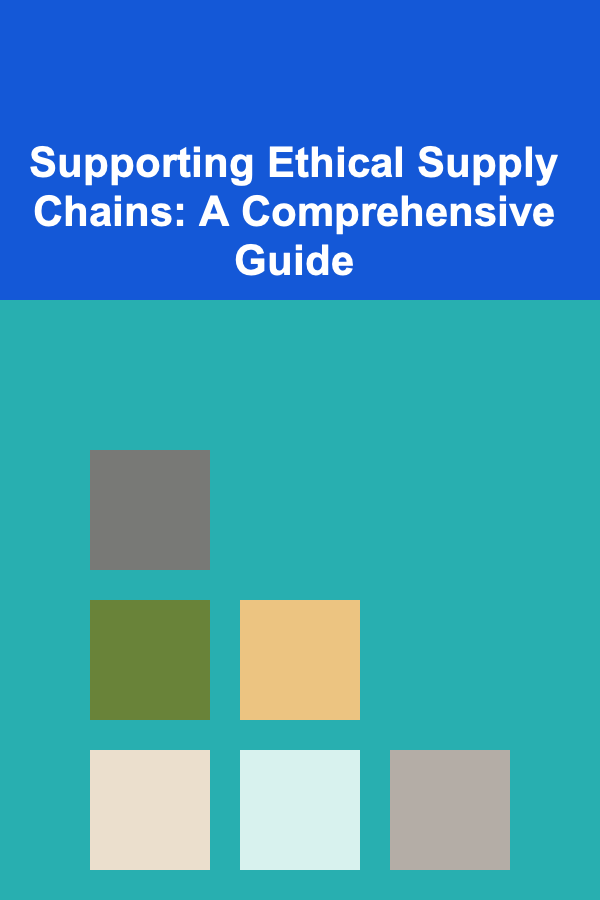
Supporting Ethical Supply Chains: A Comprehensive Guide
ebook include PDF & Audio bundle (Micro Guide)
$12.99$5.99
Limited Time Offer! Order within the next:

In today's interconnected world, the journey of a product from raw materials to the consumer often spans continents and involves numerous actors. This complex web, known as the supply chain, is increasingly under scrutiny for its ethical implications. From environmental degradation to labor exploitation, unethical practices within supply chains pose significant risks to businesses, consumers, and society as a whole. This article provides a comprehensive guide on how to support ethical supply chains, exploring the challenges, strategies, and benefits of building a responsible and sustainable business model.
Understanding the Importance of Ethical Supply Chains
An ethical supply chain is one that prioritizes human rights, environmental sustainability, and fair labor practices throughout the entire production process. It's about ensuring that workers are treated with dignity, the environment is protected, and business is conducted with integrity. The importance of ethical supply chains extends far beyond mere compliance; it's about creating a positive impact on the world.
The Ethical Imperative
Fundamentally, the pursuit of ethical supply chains is a moral obligation. Businesses have a responsibility to ensure that their operations do not contribute to human suffering, environmental destruction, or social injustice. Ignoring ethical considerations can lead to reputational damage, legal liabilities, and ultimately, a loss of consumer trust.
The Business Case for Ethics
While ethical considerations are paramount, there is also a strong business case for building ethical supply chains. Companies that prioritize ethical sourcing and production often experience the following benefits:
- Enhanced Reputation: Consumers are increasingly aware of the social and environmental impact of their purchasing decisions. Companies known for ethical practices enjoy a positive brand image and increased customer loyalty.
- Reduced Risk: Ethical supply chain management helps mitigate risks related to labor abuses, environmental violations, and other potential crises. Proactive measures can prevent costly disruptions and legal penalties.
- Improved Efficiency: By fostering transparency and collaboration with suppliers, companies can identify and address inefficiencies in their supply chains, leading to cost savings and improved productivity.
- Attracting and Retaining Talent: Employees are more likely to be attracted to and remain with companies that demonstrate a commitment to ethical and sustainable practices. This can lead to a more engaged and productive workforce.
- Access to New Markets: Many governments and organizations are prioritizing ethical and sustainable products. Companies with strong ethical supply chains may gain access to new markets and opportunities.
- Investor Confidence: Investors are increasingly incorporating Environmental, Social, and Governance (ESG) factors into their investment decisions. Companies with strong ethical supply chains are more likely to attract investment and secure favorable financing terms.
The Growing Consumer Demand for Ethical Products
Consumer awareness of ethical issues in supply chains is on the rise. Fueled by social media, investigative journalism, and advocacy campaigns, consumers are increasingly demanding transparency and accountability from the brands they support. They are willing to pay a premium for products that are produced ethically and sustainably.
For example, the increasing demand for fair trade coffee and chocolate demonstrates consumers' willingness to support producers who prioritize fair wages and safe working conditions.
Challenges in Building Ethical Supply Chains
Building ethical supply chains is not without its challenges. The complexity and opacity of global supply chains can make it difficult to identify and address ethical issues. Some of the key challenges include:
Lack of Transparency
Many companies lack visibility into the lower tiers of their supply chains. They may know their direct suppliers but have little or no information about the suppliers' suppliers, and so on. This lack of transparency makes it difficult to identify and address ethical risks.
Complexity and Length of Supply Chains
Global supply chains can be incredibly complex, involving numerous suppliers, subcontractors, and intermediaries. This complexity makes it challenging to monitor and control ethical practices throughout the entire chain.
Conflicting Priorities
Companies often face conflicting priorities, such as cost reduction, speed to market, and ethical sourcing. Balancing these priorities can be difficult, especially when facing pressure from shareholders or competitors.
Weak Enforcement of Labor and Environmental Laws
In some countries, labor and environmental laws are weak or poorly enforced. This can create an environment where unethical practices are more likely to occur.
Corruption and Bribery
Corruption and bribery can undermine efforts to promote ethical supply chains. Companies may be pressured to engage in unethical practices in order to secure contracts or avoid penalties.
Cultural Differences
Cultural differences can also pose challenges. What is considered ethical in one culture may not be in another. Companies need to be sensitive to cultural nuances and adapt their ethical standards accordingly.
Information Asymmetry
Suppliers often possess more information about their own practices than buyers. This information asymmetry can make it difficult for companies to assess the true ethical risks in their supply chains.
Strategies for Building Ethical Supply Chains
Overcoming these challenges requires a strategic and multifaceted approach. Here are some key strategies that companies can use to build ethical supply chains:
1. Conduct a Risk Assessment
The first step in building an ethical supply chain is to conduct a thorough risk assessment. This involves identifying the potential ethical risks in your supply chain, such as forced labor, child labor, environmental degradation, and corruption. Consider factors such as the geographic location of your suppliers, the types of products or services they provide, and the industry in which they operate.
Use tools like country risk indices, industry reports, and NGO publications to identify areas of high risk. Engage with stakeholders, including suppliers, workers, and community representatives, to gather information and insights.
2. Develop a Code of Conduct
A code of conduct is a set of principles and guidelines that outline the ethical standards expected of suppliers. It should cover issues such as labor rights, environmental protection, anti-corruption, and health and safety. The code of conduct should be clearly communicated to all suppliers and incorporated into contracts.
The code of conduct should be specific, measurable, achievable, relevant, and time-bound (SMART). It should be based on internationally recognized standards, such as the UN Guiding Principles on Business and Human Rights and the core conventions of the International Labour Organization (ILO).
3. Supplier Selection and Onboarding
Ethical sourcing begins with the careful selection of suppliers. Evaluate potential suppliers based on their ethical performance, as well as their price, quality, and delivery capabilities. Conduct due diligence to verify their compliance with your code of conduct and other relevant standards.
During the onboarding process, provide suppliers with training on your ethical expectations and requirements. Clearly communicate the consequences of non-compliance.
4. Monitoring and Auditing
Regular monitoring and auditing are essential for ensuring that suppliers are adhering to your ethical standards. This can involve on-site inspections, document reviews, worker interviews, and environmental assessments.
Consider using a combination of internal audits and third-party audits. Third-party audits can provide an independent and objective assessment of supplier performance. Look for auditors that are accredited by reputable organizations, such as the Association of Professional Social Compliance Auditors (APSCA).
It's crucial that audits are conducted fairly and transparently. Workers should be able to speak freely and without fear of reprisal. Audit reports should be shared with suppliers and used to develop corrective action plans.
5. Remediation and Continuous Improvement
When ethical violations are identified, it is important to take prompt and effective action. Work with suppliers to develop and implement corrective action plans that address the root causes of the problem. Provide suppliers with the resources and support they need to improve their performance.
Ethical supply chain management is an ongoing process of continuous improvement. Regularly review your policies and procedures to ensure that they are effective and up-to-date. Seek feedback from stakeholders and use it to identify areas for improvement.
6. Transparency and Traceability
Transparency and traceability are crucial for building trust and accountability in your supply chain. Strive to provide consumers with information about the origin and production of your products. Use technologies like blockchain to track and trace products throughout the supply chain.
Disclose information about your suppliers, the factories where your products are made, and the ethical standards you uphold. Publish regular reports on your ethical supply chain performance.
7. Collaboration and Partnerships
Building ethical supply chains is a collaborative effort. Work with other companies, industry associations, NGOs, and government agencies to promote ethical practices and share best practices. Participate in industry initiatives and support efforts to improve labor and environmental standards.
Collaborate with your suppliers to develop innovative solutions to ethical challenges. Build long-term relationships based on trust and mutual respect.
8. Empowering Workers
Empowering workers is essential for creating a truly ethical supply chain. Ensure that workers have the right to organize and bargain collectively. Provide workers with training on their rights and responsibilities. Establish mechanisms for workers to report grievances without fear of reprisal.
Pay workers fair wages and provide them with safe and healthy working conditions. Invest in programs that improve workers' well-being and opportunities for advancement.
9. Leverage Technology
Technology can play a significant role in improving ethical supply chain management. Use software platforms to track supplier performance, manage audits, and identify potential risks. Employ data analytics to gain insights into your supply chain and identify areas for improvement.
Explore the use of technologies like blockchain and artificial intelligence to enhance transparency and traceability.
10. Engage with Stakeholders
Engage with all stakeholders, including suppliers, workers, customers, investors, and NGOs, to understand their concerns and perspectives. Solicit feedback on your ethical supply chain practices and use it to improve your performance. Be transparent and responsive to stakeholder inquiries.
Establish a mechanism for stakeholders to report ethical concerns. Investigate all reports of unethical behavior and take appropriate action.
The Role of Technology in Enhancing Ethical Supply Chains
Technology is rapidly transforming supply chain management, offering innovative solutions to improve transparency, traceability, and ethical oversight. Here are some key technological advancements that are playing a crucial role in enhancing ethical supply chains:
Blockchain Technology
Blockchain offers a secure and transparent way to track products and materials throughout the supply chain. Each transaction or event is recorded in a block, which is then linked to the previous block, creating an immutable chain of information. This makes it difficult to tamper with data and provides a verifiable record of the product's journey.
For example, blockchain can be used to track the origin of coffee beans, ensuring that they are sourced from farmers who are paid fair wages and use sustainable farming practices.
Artificial Intelligence (AI) and Machine Learning (ML)
AI and ML can be used to analyze vast amounts of data to identify potential risks and patterns of unethical behavior. For example, AI can be used to monitor social media for reports of labor abuses or environmental violations. ML algorithms can be trained to predict which suppliers are most likely to engage in unethical practices.
Internet of Things (IoT)
IoT devices, such as sensors and RFID tags, can be used to track the location and condition of products and materials throughout the supply chain. This can help to ensure that products are stored and transported properly, and that they are not exposed to conditions that could compromise their quality or safety.
Cloud Computing
Cloud computing provides a scalable and cost-effective way to store and manage supply chain data. This makes it easier for companies to share information with suppliers, customers, and other stakeholders. Cloud-based platforms can also be used to facilitate collaboration and communication.
Supply Chain Management (SCM) Software
SCM software provides a comprehensive suite of tools for managing all aspects of the supply chain, from sourcing and procurement to logistics and distribution. Many SCM platforms now include features for tracking supplier performance, managing audits, and identifying potential risks.
The Future of Ethical Supply Chains
The future of ethical supply chains is likely to be shaped by several key trends:
- Increased Transparency and Traceability: Consumers and regulators will continue to demand greater transparency and traceability in supply chains. Technologies like blockchain will play an increasingly important role in meeting this demand.
- Greater Focus on Human Rights: Companies will face increasing pressure to address human rights risks in their supply chains. This will require a more proactive approach to due diligence and remediation.
- Circular Economy Principles: Companies will increasingly adopt circular economy principles, such as reducing waste, reusing materials, and recycling products. This will help to reduce the environmental impact of supply chains.
- Collaboration and Partnerships: Collaboration between companies, governments, NGOs, and other stakeholders will be essential for building truly ethical supply chains.
- Technological Innovation: Technological advancements will continue to drive innovation in ethical supply chain management. AI, ML, and IoT will play an increasingly important role in identifying risks, improving transparency, and empowering workers.
Conclusion
Building ethical supply chains is not just a matter of compliance; it is a strategic imperative that can enhance reputation, reduce risk, improve efficiency, and attract and retain talent. By adopting the strategies outlined in this article, companies can create supply chains that are not only profitable but also socially responsible and environmentally sustainable. The journey towards ethical supply chains requires a commitment to transparency, collaboration, and continuous improvement. By embracing these principles, businesses can contribute to a more just and sustainable world.

How to Extend the Life of Your Roof with Proper Maintenance
Read More
How to Keep Rental Property Maintenance Costs Under Control
Read More
How to Maintain Your Home While Dealing with Pet Shedding
Read More
How to Prioritize Home Renovations When on a Tight Budget
Read More
How to Solve Crossword Puzzles Online and Apps
Read More
How to Design a Customer Service Planner for a Small Retail Business
Read MoreOther Products

How to Extend the Life of Your Roof with Proper Maintenance
Read More
How to Keep Rental Property Maintenance Costs Under Control
Read More
How to Maintain Your Home While Dealing with Pet Shedding
Read More
How to Prioritize Home Renovations When on a Tight Budget
Read More
How to Solve Crossword Puzzles Online and Apps
Read More